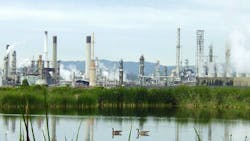Marathon partnering with Neste on Martinez refinery-to-renewables project
Marathon Petroleum Corp. (MPC) is adding Neste Corp. as a partner on MPC’s previously announced strategic repositioning of its now-idled Martinez, Calif., refinery into a renewable fuels production site (OGJ Online, Aug. 3, 2020).
As part of definitive agreements signed in early March—and pending customary closing and regulatory approvals—Neste will join the Martinez Renewable Fuels project (MRFP) as a 50-50 joint-venture (JV) partner with a total investment of $1 billion, inclusive of half the total project development costs estimated through MRFP’s completion, MPC and Neste said in separate releases.
While MPC will continue to manage project execution and operate the renewables plant, both companies will be responsible for feedstock sourcing, and production output will be split evenly between the partners.
Each partner also will be responsible for marketing the proposed JV’s production of renewable products under its own brand, the companies said.
"We're excited to partner with Neste as this strategic partnership enhances our strong Martinez project by leveraging our complementary strengths and expertise and is consistent with our previously announced strategy to source low carbon intensity feedstocks through long-term arrangements, [JVs], and alliances. The project will [use] existing processing infrastructure, diverse inbound and outbound logistics, and is optimally located to support California's Low Carbon Fuel Standard goals while strengthening MPC's footprint in renewable fuels," said Michael J. Hennigan, MPC’s president and chief executive officer.
Neither MPC nor Neste revealed a definitive timeline for when they anticipate official closing of the JV other than to confirm precedent conditions include, among others, obtaining necessary permits following certification of MRFP’s final environmental impact report (EIR), a draft version of which remains under evaluation by California’s Contra Costa County Department of Conservation and Development (DCD) after closing of the public comment period in mid-December 2021, according to DCD updates.
Currently targeted to begin production of 260 million gal/year of renewable diesel in second-half 2022, MRFP is scheduled to bring pretreatment capabilities online in 2023 and reach full nameplate production capacity of 730 million gal/year by yearend 2023, MPC and Neste said.
Estimated total project costs for MRFP remain at about $1.2 billion, according to the companies.
In an Oct. 15, 2021, update on MRFP, MPC said it estimates the conversion project will reduce greenhouse gas emissions (GHGs) by 60%, criteria air pollutants by 70%, and water use by 1 billion gal/year compared to the site’s previous operations as a petroleum refinery.
Project overview
Based on MRFP’s current draft EIR, the project will involve converting existing conventional units of the former Martinez refinery to process renewable feedstocks, such as soybean oil, corn oil, rendered fats, and other miscellaneous bio-based feedstocks—including used cooking oils and other vegetable oils—into renewable diesel, naphtha, propane, and treated fuel gas.
The conversion would involve adding new units and removing obsolete units that cannot be repurposed for processing of renewable feedstock. Proposed new units would include a renewable feedstock pretreatment unit, wastewater treatment equipment, and an advanced three-stage low-NOx thermal oxidizer. Equipment scheduled to be removed includes a crude unit, gasoline hydrotreater, alkylation unit, fluidized catalytic cracking unit, reformers, delayed coker, steam boilers, among others, according to DCD project documents.
Proposed startup of MRFP later this year would follow MPC’s 2021 full commissioning of a grassroots renewable diesel production unit built as part of the operator’s conversion of its former conventional crude oil refinery in Dickinson, ND, into a renewables manufacturing site that now produces 12,000 b/d of 100% renewable diesel from soy and corn oil (OGJ Online, Aug. 5, 2021).
About the Author
Robert Brelsford
Downstream Editor
Robert Brelsford joined Oil & Gas Journal in October 2013 as downstream technology editor after 8 years as a crude oil price and news reporter on spot crude transactions at the US Gulf Coast, West Coast, Canadian, and Latin American markets. He holds a BA (2000) in English from Rice University and an MS (2003) in education and social policy from Northwestern University.

